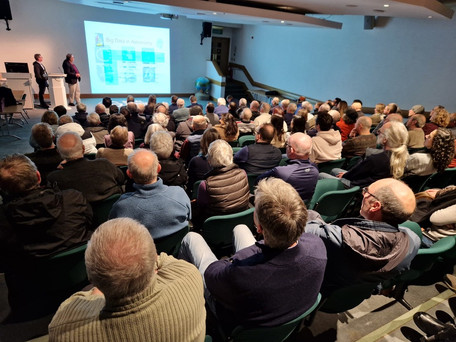Dark Energy: Einstein's "Biggest Blunder"?, by Professor Ofer Lahav
- Phil Benson

- Feb 10, 2025
- 2 min read
A big treat on Monday 10th February as we welcomed Professor Ofer Lahav (UCL) to talk about Einstein’s “biggest blunder” and the topic of Dark Energy – the second of our lectures this season on this area of astrophysical research. As Ofer said at the beginning of his talk, “A year and a half ago, this would have been a very boring talk…” – a reflection of how rapidly progress has been made in this field. Fortunately for our members, Ofer has been involved in this research for over 20 years and deftly took us on a fantastic journey through the major projects making headlines today. These include the DESI galaxy map of the cosmic web, the DES dark matter map, and, most recently, ESA’s Euclid mission, which recently released its first image of an Einstein ring (ESA Euclid Mission).
But what was Einstein’s “blunder,” exactly? Briefly, our expanding universe does not fully match what we observe in cosmology (as demonstrated by the pioneering work of Vera Rubin), suggesting that a significant portion of matter (and energy) remains hidden – or dark. To address this discrepancy in General Relativity, Einstein introduced a factor known as Lambda (Λ), the cosmological constant. His intention was to create a static universe, but this idea was later overturned when Edwin Hubble demonstrated that the universe is expanding, as described by his famous Hubble constant relating distance to velocity.
Demonstrating this, Ofer couldn’t resist throwing in an equation or two – albeit gently – to bring us up to speed with current thinking. The big question remains: Does the value of Lambda change over time, or is it truly a constant? While this adds further complexity (and more equations!), it also opens new avenues of inquiry, allowing us to address gaps in our understanding. Despite the technical nature of the topic, our speaker explained the state-of-the-art research with patience and enthusiasm – even weaving in some philosophy towards the end. Given that Einstein modified Newton’s laws, perhaps the time has come for someone equally bold to modify Einstein’s theories.
Either way, more data – currently embargoed – is expected to be released soon. Given the multi-million-dollar cost of these surveys, one might question the expense, but with data collected at a cost of just $1 per galaxy, it’s arguably very good value for money!
So, where do we go from here? Astrophysics is increasingly relying on AI and Deep Learning, just as many other research fields do. These tools are becoming ever more important, given the vast number of galaxies being measured. However, the “killer application” for AI in cosmology has yet to be demonstrated – so, for now, it’s good to know that we humans still have some use!



































Comments